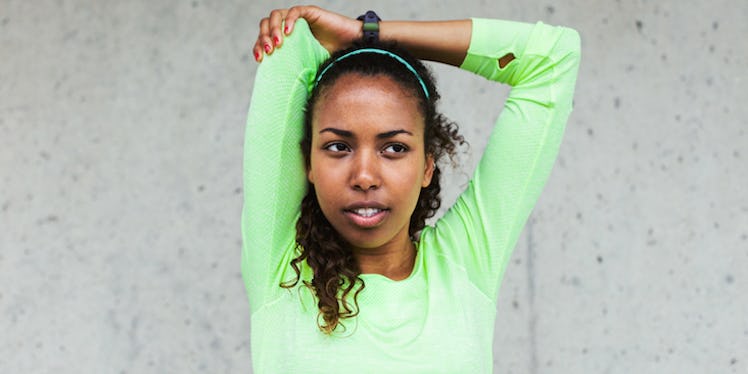
This One Simple Factor Determines What The Best Time Of Day Is To Work Out
When I hear the term "rise and grind" from my friends who swear by early morning exercising, I honestly cringe. TBH, I can barely convince myself to part with my pillow to eat a bomb breakfast, let alone squeeze in a sweat sesh before sun up. But early birds who hit the elliptical first thing in the morning swear that it's the best time of day to work out, because it leaves them feeling energized AF. But, if you're the opposite of a morning person and that 6 a.m. sweat sesh will just never sound appealing to you, you may be in luck.
A study in the Journal Of Strength And Conditioning revealed that strength and flexibility are actually greatest in the late afternoon, and this is because of your body's circadian rhythm. Your circadian rhythm is your body's natural clock and it causes your body temperature to rise slightly throughout the day and peak in late afternoon.
This is why using that body clock as a factor to schedule your workouts may be the simplest factor in determining the best time of day to work out.

Like, going to have to skip out on that 6 a.m. Soul Cycle class... cause, science says so. #SorryNotSorry. So, Elite Daily spoke with Dr. Anthony Balduzzi, founder of the Fit Father Project, to get the low down on how much your circadian rhythm really impacts your #GymGains.
Here's what he told us:
Your body runs on a hardwired clock called your circadian rhythm that automatically control your sleep, appetite, energy, and hormone levels. For example, cortisol naturally rises in the morning to wake you up and energize your bodies for the day to come. Conversely, when the sun goes down in the evening, your brain begins to secrete melatonin to relax and prepare your body for sleep.
Balduzzi told us that circadian rhythms are largely synced with the amount of sunlight (or lack there of) in your environment, because your body is designed to live in sync with the natural rhythms in nature.
Now you know what to blame when you just can't drag your butt to your a.m. sweat sesh on those dim winter mornings, amirite?
Dark and dreary conditions or not, Balduzzi confirmed that circadian rhythm can indeed reveal the optimal time to hit the weight room.
When it comes to exercise, there benefits to scheduling your workout time around certain circadian rhythms. Testosterone peaks in the late morning/early afternoon, which could make a lunchtime workout more ideal for muscle building. Furthermore, when it comes to fat loss, a little bit of morning cortisol can actually be your friend.
Balduzzi said that this is why if you swear by working out right when you wake up -- before you've had time to eat anything -- it can actually preserve morning cortisol levels and may create some modest fat burning benefits.
But the benefits of working out before you've had breakfast isn't actually based in enough evidence to suggest shaking up your morning routine if doing this doesn't already come naturally to you. A study in The Journal of the International Society of Sports Nutrition randomly assigned a group of women to either fast before their sweat sesh or drink a light shake.
The trial concluded that their was no difference between fasted and non-fasted aerobic exercise, because both groups burned the same amount of fat in the end.
Bottom line: Syncing your daily workouts with your body's natural circadian rhythms can help optimize your workout results -- if you're really being particular about it.

But Balduzzi says not to sweat it (literally) if you can't cater to your body clock.
Above all, the best time to exercise is the time that's fits into your schedule. Sustainable workout routines that fit into your work-life schedule trump all minor workout timing optimization around circadian rhythms. The best workout routine will always be the one you can stick to - no matter what time of day you "get it done."